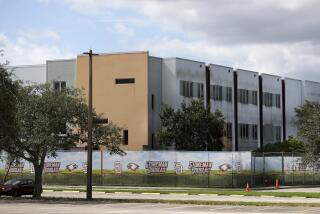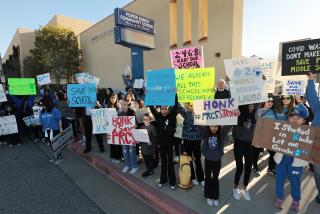Work begins to demolish Newtown school massacre site

L.A. Times national correspondent Tina Susman talks with video reporter Ann Simmons about the demolition of Sandy Hook Elementary School in Newtown, Conn., the site of last December’s massacre of 20 first-graders and six adults.
NEWTOWN, Conn. — The firehouse is still there, just as it was on the day of the shooting, except for the 26 bronze stars adorning its roof: one for each victim of the Sandy Hook Elementary School massacre.
The school is still there too, a short walk up the road, but not for long. This week, gates guarding one of the nation’s most notorious crime scenes quietly swung open to heavy machinery and construction trucks as work began to demolish the campus where 20 first-graders and six school employees died Dec. 14.
Rarely has a major tear-down been conducted in such a hushed manner, but rarely has a project been steeped in such tragedy and debated in the midst of a town in mourning, in full view of those hit hardest. Newtown, though, is moving forward, say residents and leaders, who point to the exhaustive meetings that decided the school’s fate — just five months after the shooting — as proof of the town’s determination.
The town has announced that it will forgo official ceremonies marking the massacre’s first anniversary; it asked for a halt to gifts that for months poured in, from individuals as well as organizations; and it tackled the practical matter of the school’s future before considering whether to erect a permanent memorial. A panel to deal with that issue was not named until this month.
WHO THEY WERE: Newtown shooting victims
“I think this is really one of the ways in which our community does go forward, in that we are all in this together,” Newtown’s highest elected official, Patricia Llodra, said on May 15 after the 28-member Sandy Hook School Task Force voted unanimously to demolish the school and build a new one on the same spot. “We’ve ended up in a place that is the best we could do, under horrible circumstances.”
In an Oct. 5 referendum, the town voted to fund the project with a $49-million state grant. “Yes” votes were 4,504; “no” votes totaled 558.
If all goes according to plan, the demolition will be finished well before the December shooting anniversary. The work site will be shielded from public view. Every piece of metal, glass, brick and concrete from the low-slung buildings, the playground, the jungle gym and the driveway will be pulverized to prevent chunks of the tragedy from becoming souvenirs. The new school’s entrance will be relocated to save people from having to pass the firehouse where anguished parents waited hours before learning their children were dead.
On Monday, as autumn leaves fell like golden flakes across the hilly neighborhood surrounding the shuttered school, workers were in the beginning stages of the project, one of dozens the task force considered.
Even if construction proceeds as planned and the new school opens in 2016, some of the more than 400 children displaced from Sandy Hook and sent to a temporary school in neighboring Monroe will have reached middle school by then. They will never spend time in the new structure.
That concerned some parents of Sandy Hook kids, who spoke at the task force’s five meetings and at a public forum Jan. 13. Voices shook in frustration at times as speakers opposed to the demolition argued that it was a waste of money and that it would deny traumatized children the chance to return to familiar, comfortable surroundings.
Many speakers grew up in Newtown and attended Sandy Hook themselves. Tearing it down, they said, would be akin to destroying part of the neighborhood’s soul and surrendering to the evil carried out by the shooter — 20-year-old Adam Lanza — whose name rarely is uttered here.
“The hardest thing I’m having to deal with is … the feeling that we didn’t just lose 20 children and six adults. We’re letting him take the building too, and he’s winning,” said one parent, Peter Barresi, whose son was a first-grader at Sandy Hook when the shooting erupted.
Since then, Barresi’s little boy, now in second grade, has attended class in the Monroe school, which was built for middle school pupils. Its classrooms are too small to accommodate the games and nap times of younger children, and the toilets are too high for them to reach without stools, he said.
PHOTOS: Newtown school shooting
Barresi was among the residents who initially suggested that the task force follow the lead of officials at Columbine High School and at Virginia Tech. After mass shootings there, both schools underwent major renovations but were not razed.
But other parents, and most employees of the Sandy Hook school, said they could not imagine entering the school again or dropping their children off there.
“Our family has not asked for anything since Dec. 14, except that the building … be razed and the new Sandy Hook school be located at a new location,” Brian Engel, the father of shooting victim Olivia Rose Engel, 6, told the task force as it debated moving Sandy Hook elsewhere in the neighborhood.
Other proposed sites came with their own issues, including the possibility that some residents could be forced to sell their properties to make way for the construction.
“As a community, we’ve all been hurt. Let’s not hurt anyone else and take away their houses,” resident Michael Coppola pleaded during one meeting.
Dan Cruson, the town historian who works from an office in the historic Edmond Town Hall on Main Street, said reopening Sandy Hook was never a viable option.
“First of all, there’s the magnitude of the tragedy,” Cruson said. “I don’t mean to one-up Columbine, but the number of victims and their ages here made it different. And there’s the mere fact that getting to the school driveway means passing the firehouse, which was the scene of so much anguish.”
The site will always carry a stigma because of what occurred there, Cruson said. “With time, memories will become less raw, and with future generations, the hope is that this will become something in a history book,” he said. “But it’s a crime scene.”
In the end, Barresi conceded that the decision reached was the best compromise under the circumstances, and he found the meetings cathartic even if neighbors, friends and colleagues disagreed on how to move forward.
“This didn’t seem to fracture any relationships. It just seemed to give us a place to vent,” Barresi said.
He only wishes he could visit Sandy Hook, which he attended from kindergarten through fifth grade, before it is gone.
“Some of my fondest memories come from that school,” he said. “I want to say goodbye.”
More to Read
Sign up for Essential California
The most important California stories and recommendations in your inbox every morning.
You may occasionally receive promotional content from the Los Angeles Times.











